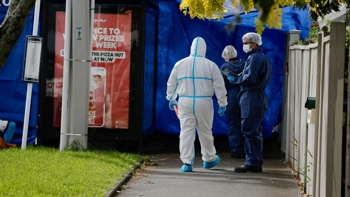Tough choices and tough love are what’s needed for a “fragile” New Zealand as it faces a “rough” economic forecast and massive infrastructure deficit, says Prime Minister Christopher Luxon.
In his first state of the nation speech as Prime Minister, Luxon spoke to an auditorium full of National Party faithful in Auckland’s Mt Wellington today.
While he believed New Zealand was the world’s best country and had the best people, it was in a “fragile” state, telling reporters afterwards the previous Labour government was to blame for “dumb and stupid” policies.
“Not everyone will like it, but I think Kiwis need a Prime Minister that levels with them, and is straight up about the state of the nation and where we’re at,” Luxon said during his speech, which omitted mentioning coalition partners Act and NZ First.
“The last few years have been too tough, for too many Kiwis. We’ve lurched from challenge to crisis – a global pandemic, conflict overseas and natural disasters.”
/cloudfront-ap-southeast-2.images.arcpublishing.com/nzme/HLZYBHQBFVG6LHNE6TEV7AYMDI.jpg)
Christopher Luxon presents his first state of the nation speech as Prime Minister. Photo / Alex Burton
Luxon said economic conditions were “rough” and signalled the long-term performance of the economy was “also a major problem.
“Inflation has stayed high – the cost of living crisis isn’t over yet, with inflation here higher than Australia, the UK, the US, Canada, Japan and the EU.
“New Zealand’s economy is now less productive than vast swathes of the former Eastern Bloc, including Poland, Slovenia, Slovakia and Lithuania.”
He later told reporters Labour was guilty of “fiscal chicanery” as government spending increased by 84 per cent since 2017 and its debt was projected to exceed $100b billion.
“In my former life, it’s what I would have called a big turnaround job.”
Labour leader Chris Hipkins hit back this afternoon, however, telling journalists at Auckland’s Big Gay Out the National Party may not have read previous Budget documents, “which would make them the laziest opposition that New Zealand has ever seen.
“The reality is, New Zealand’s economy is actually in a recovering stage after the global pandemic, as many economies around the world are.”
During his speech, Luxon noted New Zealand’s declining numeracy and school attendance rates, an unwell health care system, and an increasing number of Kiwis on an unemployment benefit.
“We’ll do everything we can to help people into work, but if they don’t play ball the free ride is over,” Luxon said, drawing a loud applause from the largely older crowd.
The prime minister said he was willing to make “tough choices” for what he described as supporting young people into employment.
“Because 24 years languishing on welfare means no hope. It means no opportunity. It means no dignity from work. I haven’t met a single young Kiwi whose ambition, creativity, and spark would be best served by a life on a benefit. So, I will not apologise for tough love.”
After his speech, Luxon told reporters New Zealand will always have a welfare net to support those in need and while he acknowledged most on an unemployment benefit fulfil the requirements, he wanted to make sure everyone’s “holding up their obligations”.
Hipkins later accused the Government of dividing the country and making vulnerable communities “more isolated and more discriminated against than they ever have been before”.
Luxon also spoke of New Zealand’s well-documented infrastructure deficit.
“Funding shortfalls for transport projects like light rail in Auckland and Wellington led the Ministry of Transport to estimate there was a more than $200b gap between the previous government’s overall transport promises and the funding it had set aside.
“If you saved $20,000 every hour, day and night, seven days a week, it would take you over 1000 years to save that $200b,” Luxon said to gasps by the National Party faithful.
Hipkins told reporters this afternoon the allegation Labour left a $200b gap was “absolute nonsense.
“We were very clear, as every government has been, that it gets funded successively on three-year plans and three-year cycles.
“There are certainly some things where we haven’t figured out how we were going to fund them long term, like Auckland light rail, for example, and that could be funded through a variety of different ways.”
/cloudfront-ap-southeast-2.images.arcpublishing.com/nzme/EUPF3TCKDZDFJAZRMZXOCNHL24.jpg)
Prime Minister Christopher Luxon, flanked by senior ministers Chris Bishop, Nicolas Willis and Simeon Brown, speaks to journalists. Photo / Alex Burton
Luxon admitted to reporters his Government was yet to explain how it would address and finance New Zealand’s infrastructure woes and that funding “is a major barrier”. He promised a plan later this year.
“Things like the second [Auckland] harbour of crossing we are very invested in,” Luxon said.
“We know we need to spend money on that. The way we may go about doing that, how we fund it, how we finance it, all of that we’ll look into in the coming months,” he said, adding the Government will explore public money and private funding models.
He said this would also find the “right balance” between protecting the environment and building infrastructure.
The prime minister said he wants to work with Auckland mayor Wayne Brown “on supercharging” the Super City after Brown was critical of the Government nixing the regional fuel tax from June 30, leaving a shortfall in Auckland’s transport funding of $1.2b over the next four years.
Advice from Treasury, Luxon noted during his speech, showed Kainga Ora’s forecasts relied on the sale of 10,200 state homes to balance its books as the housing agency’s debt forecast to rise to $29 billion by 2033.
Labour has blamed National for underfunding public housing.
In December, the Government announced an independent review, led by former Prime Minister Sir Bill English, into Kāinga Ora’s “financial situation, procurement, and asset management”.
Sam Hurley is the Herald’s news director and joined in 2017 after previously working for 1News and Hawke’s Bay Today.
Take your Radio, Podcasts and Music with you









